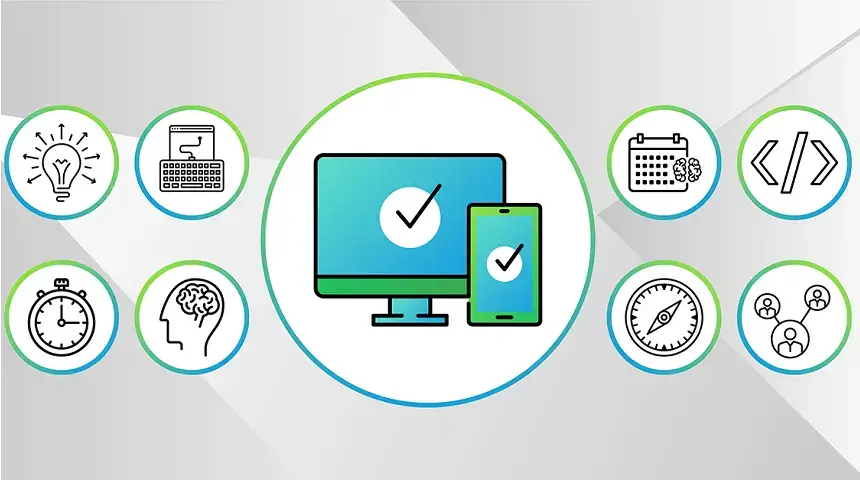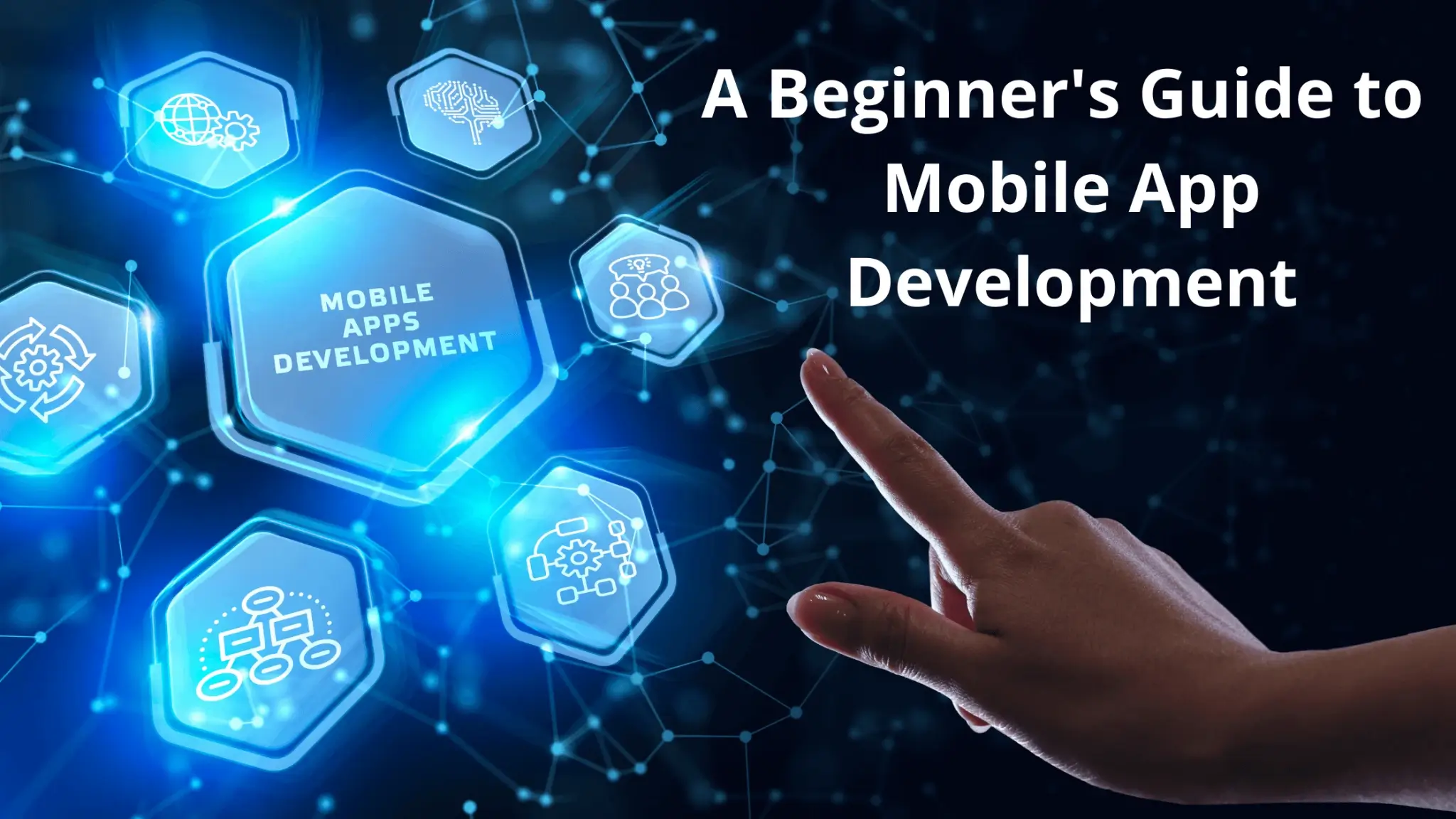People are curious about how long it takes to build a mobile application. The cost of developing one and all that goes into making a mobile application. Once they realize there’s benefit in having their own app for business, the discussion starts turning around; when can we start working on this? That’s why you want to know – how long the mobile app development process takes and what exactly is involved with developing your own mobile application? This beginner’s guide will teach you everything you need to know about creating your first mobile application. Read on- 
Image Source Mobile app development is becoming increasingly popular. Mobile app development trend is only going to continue to grow. You must take advantage of this rapidly growing industry. With the iOS App Store and Google Play boasting over 4 million apps at the time of writing, it’s only a matter of time before you’ll need your app to compete. Whether you want to build a gaming app, an app with social media elements (like Instagram or Twitter), or even a dating app, there’s a lot to learn to get your idea off the ground. The mobile application market is competitive; there are plenty of platforms you can develop for (iCloud, Sprint, Google Play) and billions of devices to target if you’re planning on developing Android apps. To get started on your journey to develop your very own mobile app, you’re going to need some in-depth information about the field of mobile app development. There are several different programming languages used when preparing mobile applications for a multitude of different devices. You’ll also need a little patience and dedication to learn the skills if you don’t have any experience.
What is mobile app development?
Mobile app development is a process for creating mobile applications that run on mobile devices or tablets. Hence, the mobile application development process needs to create software installed on the device, allow backend services for data access through APIs, and test the application on target devices. To develop scalable mobile apps, you also must consider screen sizes, hardware specifications, and many other aspects. It is essential that the app development process is well defined and understood by entrepreneurs, startups, and developers. Many types of mobile applications, including games, social networking apps, media players, and more. The process includes design and programming phases to create the desired app with all the developer’s features, then testing to verify that everything works correctly before the app launches in an online store like the Apple app store for app users to download onto their phones or tablets.
Why are mobile applications critical, especially their development?
Mobile applications have been a massive part of our lives now. They are the way we communicate with friends and family, order food from restaurants, and even find a date! The world has changed so much in just a few years because of these little apps that can do anything you want them to do; it’s hard to believe they’ve only been around for such a short period. Mobile applications make life easier, more convenient, and even more entertaining sometimes. But how could all this happen without the app developers who created these amazing apps? There is no doubt that mobile application development is one of the most critical aspects of today’s technology industry. What would we do without it? With the number of people accessing the internet on their smartphones increasing daily, your app must be convenient. Not just have the sales of smartphones and tablets increased, but the amount of mobile apps installed has also expanded exponentially.
Mobile app development platforms
The two most prominent mobile app platforms are iOS from Apple Inc. and Android from Google. The initial step in developing an app is deciding which platform it will run on. Once you decide what type of platform your app will use (native versus cross-platform), you’ll need to choose one of the two types: native app development or cross-platform app development software developing kit (SDK). Native SDKs provide more functionality than cross-platform SDKs but require more time and money to develop because they’re specific for each operating system.
Alternatives for developing mobile applications
You can approach mobile app development in four distinct ways: 1. Create native mobile applications 2. Create cross-platform native mobile applications 3. Create hybrid mobile applications 4. Create progressive web applications When developing an application, it is crucial to choose the right approach. By matching your mobile strategy with what you want in your app’s user experience and what computing resources are available, along with many native features needed for certain types of apps (e.g., games), there will be more success than failure on either path; when developing a mobile app!  Image Source What programming language is used for the mobile app development process? There isn’t just one single “best” programming language in the mobile app development process, and it depends on what kind of application you’re developing. Let’s look at some of the most popular languages for app development so you can make the best choice.
Image Source What programming language is used for the mobile app development process? There isn’t just one single “best” programming language in the mobile app development process, and it depends on what kind of application you’re developing. Let’s look at some of the most popular languages for app development so you can make the best choice.
1. Java
Java is one of the most popular programming languages globally, and it’s no wonder why it’s the first choice when developing mobile applications. It was originally released in 1995 as a successor to the C++ programming language. Java has steadily grown in popularity and can now be found on most devices, from computers to mobile phones. The name derives from the word “javana,” which means “coffee” in Indonesia’s local Javanese language. Java is one of the most popular languages for programmers because it runs across multiple platforms without modification or porting, making it easy to deploy code onto different machines and operating systems. This also allows developers to build once and deploy many times; this saves time and resources when developing software products. While it’s conceivable to develop iOS apps employing Java, this language is most often used for Android app development as it’s a broadly accepted and well-established language among developers. It’s also flexible, and Android already has several development tools for it.
2. JavaScript
JavaScript has been a long-time programming language preference among developers. It’s often used for web development, and there are many frameworks available, such as AngularJS, to help simplify this process. JavaScript is object-oriented by default, but it also supports functional programming patterns like map/reduce or promises found in libraries like Underscore or Async.js. The language was designed to work well both inside and outside of web browsers – an important consideration when you’re developing apps! There are also many ways to use JavaScript, including server-side scripting, cross-site scripting (XSS), etc. React Native is a broadly used JavaScript framework that allows for cross-platform apps development for iOS and Android.
3. Kotlin
Kotlin is a more advanced programming language and is an excellent alternative to Java, and it is interoperable with other languages on the JVM like Java or Scala. This makes it an ideal choice for Android development, particularly where Java can be quite verbose. The Kotlin team has spent years designing and refining this modern language to write code faster without decreasing the quality or security of their programs.
4. Swift
The Swift programming language is a powerful and easy-to-learn programming language for building iOS and Mac OS apps. Apple has adopted it as the main development language for their platforms. It’s a developer’s preference for building iPhone and iPad apps for a wide variety of reasons. Unlike other languages, like Objective C, it’s a very precise, type-safe language that’s also not difficult to code. Swift is also extremely interactive, indicating it can work in an interactive setting, and you can see the output while you’re coding. This also makes it simple to find coding errors at the coding stage. How to determine the best programming language? With so many new languages and frameworks, it can be hard to make the right decision to develop an app. When analyzing the programming languages, frameworks, and SDKs for mobile app solutions, you have to weigh the frontend (UI) development environment and be aware of the backend development environment.
Types of mobile applications
From a coding perspective, developers can elect to one of three types of mobile apps-
1. Native mobile apps
Native mobile apps are programmed in a language specific to the platform. As a result, they can access all of the device capabilities and provide a more immersive user experience than HTML5 based web applications, which rely on a browser running on the mobile operating system. For example, native iOS apps are written in Objective-C or Swift programming languages, while Android uses Java. There is also an increasing trend of developing hybrid apps that combine features from both native and web app development paradigms.
2. Cross-platform mobile apps
Developing a cross-platform app is the best way to provide an optimal user experience on multiple platforms. Cross-platform apps share common code and resources that run natively on each platform, providing fluid and uniform UI across all devices. Web developers can leverage their HTML5, CSS3, JavaScript, and jQuery skills with tools like PhoneGap or Appcelerator’s Titanium to create cross-platform mobile apps for iOS, Android, and Windows.
3. Mobile web apps
Mobile web apps are quickly becoming the most popular way to create an app, and for a good reason. Mobile websites are not presented as an installed app on the device, but they are an important paradigm to consider while building for a mobile device. As an app developer, it is important to know what stage your mobile application is in. This is because the delivery phase of the mobile app development project will ultimately determine when your app will be available for download. You are required to send your app out to a testing platform that will monitor your app for viruses, estimate its security, and ensure that it functions the way it’s supposed to. We understand that many people are doubtful about getting started with app development. It can be overwhelming, especially for those who don’t have a technical background or knowledge in programming languages like Objective-C and Swift. If you want your idea to come to life but lack the knowledge necessary, At Squash Apps, our team of experts is here to help! So spend some time on our website and blog today exploring how we can make your dream mobile app development project happen without any troubles along the way. You won’t regret it! Read more- https://squashwebsiteprod-b8a4gfcqgmh2fmfn.westus-01.azurewebsites.net/blog/10-steps-to-the-best-mobile-app-development-process/. For more information, visit our official website- https://squashwebsiteprod-b8a4gfcqgmh2fmfn.westus-01.azurewebsites.net/.

Parvin Khatun is a writer who works in Squash Apps is dedicated to providing high-quality content that can help clients get more visibility on the search engine results pages. She works hard to boost her clients’ online presence through her content writing services- she has experience in SEO content writing, she writes about website articles, technical articles, and many others.


